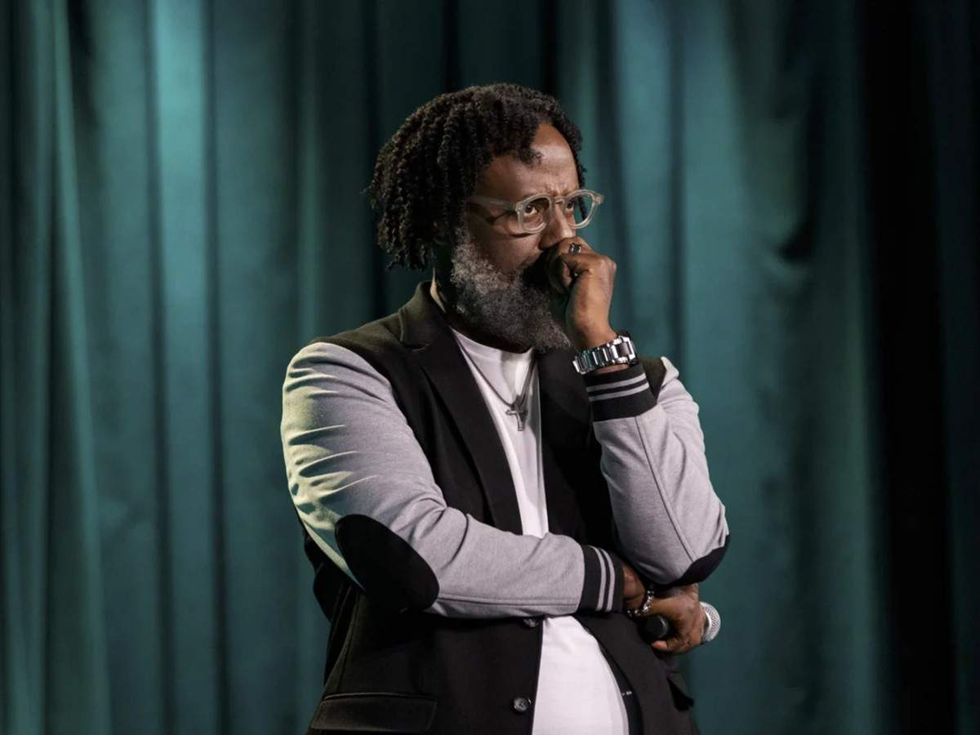At the movies
Journalist Skip Hollandsworth helps bring "only-in-Texas" true-crime story tothe screen in Bernie
 Jack Black and Shirley MacLaine star in Bernie.
Jack Black and Shirley MacLaine star in Bernie. Jack Black is BernieCourtesy photo
Jack Black is BernieCourtesy photo Skip Hollandsworth at the Hollywood premiere of Bernie.Courtesy photo
Skip Hollandsworth at the Hollywood premiere of Bernie.Courtesy photo
Texas Monthly writer Skip Hollandsworth would be among the first to agree with Jim Morrison’s memorable take on human nature: People are strange.
Consider: As his editor, Jake Silverstein, duly notes this month in the magazine that provides them both with gainful employment, Hollandsworth has written – vividly, perceptively and often award-worthily — about such notorious types as Andrea Yates, the H-Town mother who drowned her children in the family bathtub; Clara Harris, the Clear Lake dentist who brought her troubled marriage to a violent quietus by repeatedly running over her husband with her Mercedes; and Susan Wright, the Harris County housewife who stabbed her husband 193 times because she was really, really pissed off at the guy.
And yet, even after years of frequent exposure to so much extreme behavior, Hollandsworth admits he remains uniquely astounded by the life and crimes of Bernie Tiede, a seemingly genial and mild-mannered fellow who came to grief while working as assistant director of a funeral home in the East Texas town of Carthage.
Even after years of frequent exposure to so much extreme behavior, Hollandsworth admits he remains uniquely astounded by the life and crimes of Bernie Tiede.
In 1997, Tiede, then 39, was arrested for the murder of 81-year-old Marjorie Nugent, a wealthy widow who by most accounts was a singularly, if not aggressively, unpleasant individual. Tiede had long been Mrs. Nugent’s attentive companion and trusted confidant. So trusted, in fact, that he had ready access to her bank accounts.
Danny Buck Davidson, the criminal district attorney who prosecuted the case, claimed Tiede murdered Mrs. Nugent because she had discovered he was embezzling. But Tiede’s defense attorney counter-argued that his client committed the crime during a bout of temporary insanity – and, furthermore, had used Mrs. Nugent’s money only to help needy Carthage residents.
Whatever his motivation, Tiede shot Mrs. Nugent four times in the back, then stuffed her body in his deep freeze. (He would later claim that he’d fully intended to eventually give her the decent burial she deserved.) Amazingly, no one noticed her absence for the better part of nine months. Incredibly, after the murder was uncovered and Tiede was arrested, many of the good folks of Carthage rallied to his defense.
Indeed, prosecutor Davidson wound up asking the presiding judge to move the murder trial to San Augustine, because he thought there weren’t enough potential jurors in Carthage who’d be willing to convict the improbably popular defendant. (The judge, it should be noted, agreed.)
“Midnight in the Garden of East Texas,” Hollandsworth’s account of bizarre case, was published in the January 1998 issue of Texas Monthly. Shortly after it appeared, the writer was approached by Houston-born filmmaker Richard Linklater, who wanted Hollandsworth to adapt the piece into screenplay.
Linklater was convinced that this stranger-than-fiction true-crime story could be turned into a memorable movie. Unfortunately, it took him more than a decade to find investors who agreed with him.
But some things are well worth waiting for: Bernie, the darkly comical and critically acclaimed film based on Hollandsworth’s Texas Monthly article, opens in Houston this weekend. It features Jack Black in the title role, Matthew McConaughey as Danny Buck Davidson and Oscar-winning living legend Shirley MacLaine – winner of the 2010 Cinema Arts Festival Houston award for lifetime achievement – as the notoriously ill-tempered Marjorie Nugent.
And Hollandsworth – who did indeed co-write the screenplay with director Linklater – visited Houston last week to tell us all about it.
CultureMap: The great David Lean once complained that the worst part of filmmaking was having to leave on the cutting-room floor some scenes that were difficult to shoot yet dear to his heart.
Skip Hollandsworth: OK, I’m already terrified. Here I am, I’m just a hack magazine writer, and you’re bringing up David Lean. Oh, my God.
Linklater was convinced that this stranger-than-fiction true-crime story could be turned into a memorable movie. Unfortunately, it took him more than a decade to find investors who agreed with him.
CM: Then let’s put it another way: What did you hate to lose while you were translating this story from magazine article to motion picture?
SH: Well, that’s a tough one. And I think it’s the reason Rick hired me. He could have hired any screenwriter he wanted to. But he hired me because I think he already envisioned 14 years ago exactly what he wanted this movie to look like. And how he wanted it to be. He wanted it to be close to a documentary. So he wanted someone with him who could do the research, pull quotes from people, get the stories right. So that everything would come out of the actual facts of the story.
I’ve had articles optioned before, and the screenwriter’s come in and, basically, treated the original article as a very basic blueprint for them to take off on their flights of fancy. But right from the start, Rick saw this as a way to paint a picture of a corner of the world that nobody knows about.
CM: And he didn’t want anyone to Hollywoodize it, right?
SH: Yeah, but here’s the thing: When I realized I was going to get my name on this movie – when I realized, “Hey, I’m a screenwriter!” – I began writing these scenes that I thought were fantastic. My creative side was coming out. But whenever I did that, Rick would ask – in that gentle, loving way of his – “Did that really happen?” And when I said it didn’t, he’d say, “Hell, no.”
So, to answer your question, no, there wasn’t anything that had to be taken out [in the editing room]. We just stuck to the facts, and the narrative came out of that.
CM: How did you feel when you learned Bernie was finally going to be made – with this particular cast?
SH: Stunned. Flabbergasted. Rick said, “We’ve gotten $5 million for this movie.” Which was a statement in itself about the state of independent film in America in 2010. But then Rick got Black, McConaughey and MacLaine to take Screen Actors Guild minimums to be in the movie. So if Jack Black got $12 million or whatever for his last movie, Gulliver’s Travels, and then got, what, $65,000 for this one – it must mean that he just loved the idea of what he was going to get to do in the movie. I was pretty amazed.
Actually, I think one of the reasons the script didn’t sell early on was, there was no actor around who could be clearly identified as the guy who could play Bernie. I think Rick was sort of searching for that when he had meetings with people. I wasn’t in on them, but as I understand it, when they asked him, “Well, who’s going to be your Bernie?” – he didn’t know what to say.
And then here comes the serendipitous stuff. He meets Black when they do School of Rock and they become fast friends. Rick’s direction of School of Rock helps push Black’s career into the stratosphere. So Black always loves this idea of working with Rick again.
CM: But did you have any reservations about someone known as a comic actor playing this particular role?
SH: [Laughs] Joe, I have no idea what actors can or cannot do. I’ve never been close to this world before. I didn’t know anything. I was, like, on the set watching open-mouthed. I never engaged in any conversations like, “Oh, Jack Black? Does he have the right dramatic gravitas?”
CM: How about Matthew McConaughey? Were you surprised that he wanted to play the district attorney?
SH: No, because Matthew and Rick are like brothers. They love each other. They take batting practice at the UT baseball cage. Matthew has now bought a home in Austin, so they do even more stuff together. And Matthew has often said that of all the directors he’s ever worked with, there have only been a couple that have allowed him to help mold the character he played.
And Rick is one of those directors – well, remember when I wrote in my [May 2012 Texas Monthly] article about how Shirley MacLaine got crazed because Rick wouldn’t tell her what to do? That’s because he makes you come to the character, and find that character for yourself. And Matthew loves that.
Let me tell you something about else Matthew McConaughey: The guy is a brilliant improvisational actor.
Let me tell you something about else about Matthew McConaughey: The guy is a brilliant improvisational actor. He would go off script, and I would be sitting there thinking, “This is fantastic – and I’m going to get credit for it.”
CM: When Shirley MacLaine accepted her Cinema Arts Festival award here in 2010, she couldn’t say enough nice things about Jack Black.
SH: Yeah, I heard about that. It was right after we’d finished filming.
CM: That probably helped them develop such a distinctive chemistry on screen – the fact that she thinks so highly of him.
SH: She still does. In the latest round of press stuff she did for the film, she went absolutely crazy for him.
CM: So let’s cut to the chase: Why do you think Bernie killed the old lady?
SH: Well, let’s start with the theories that have been put forth. Danny Buck Davidson, the district attorney, is completely convinced – though he has not a shred of evidence – that Mrs. Nugent discovered that Bernie was stealing money out of her accounts while she was alive and spending it on townspeople and a town she didn’t like. She got furious, and was headed to the bank to take his name off of all her accounts. Or she was headed to the police, to report that he was stealing money from her. Either way, he had no choice but to shoot her.
And if you go to East Texas right now, Danny Buck will invite you into his office and give you a 30-minute lecture to the effect that this is absolutely what happened.
The other theory is, here is this gentle man who had spent his life devoted to bringing dignity to other people’s lives, to lifting up other people. I mean, he was lifting up Mrs. Nugent. Here was this deeply unhappy woman who didn’t know what to do except be angry. And he wanted to make her feel better before she died. And while doing all of this, he loses his own self. And he has a moment where he loses all sense of sanity in one afternoon, and shoots her four times in the back.
So let’s cut to the chase: Why do you think Bernie killed the old lady?
CM: And yet he was not able to use temporary insanity as a defense.
SH: True. But really, just because the courts don’t allow that as an adequate defense – does that mean that people don’t suddenly snap? They don’t have a temporary bout of insanity, and just lose it? Because if you talk to Bernie – that’s what he says happened. And he’s powerfully convincing.
CM: What do you think?
SH: I’m a journalist. I keep it straight down the middle. I put the facts in front of you, and let you decide.
CM: But you’re also a scriptwriter. And that means you had to have some opinion, if only to be able to dramatize the story.
SH: Well, clearly, we went in the direction of Bernie having a bout of temporary insanity. But still…
CM: Yes?
SH: There remains the mystery: What was up with Bernie? What made him kill Mrs. Nugent? We’re never going to know for sure. We can’t eliminate the possibility that maybe there was something sinister in Bernie. But I’ve done a million of these stories where I go through people’s lives, searching for that defining moment that leads them to commit an act that just defies explanation. And there is nothing in Bernie’s background that indicates he had any kind of anti-social personality that would lead him to do something like this. Usually you can find some evidence in someone’s past…
CM: Unless they’ve been very good at repressing their rage.
SH: And that’s Jack’s theory: This is a guy who didn’t know how to deal with his own sense of frustration, so he bottled it up – and then it just exploded.
But here’s another thing: Did Bernie ever spend any money on himself? There’s always been rumors that he hid a few million dollars somewhere in Europe, and he’s waiting until he gets out to get it. But there’s zero evidence of that. All the money’s been accounted for. Bernie never spent any money on himself. So if he wanted to kill her for some kind of financial gain – wouldn’t you have seen some evidence of him taking advantage of that financial gain?
CM: Also, wouldn’t he have come up with a better plan than simply stowing the body in a freezer for nine months?
SH: I can understand someone doing something like Bernie did, and you sort of freeze yourself, emotionally freeze yourself, because you don’t know what to do. And with each passing day, no one does anything about it – and that creates even more inertia.
CM: It’s a cliché, but in this case it’s true: You wouldn’t dare make up a story like this.
SH: I think the worry back when we were first trying to get this made was, because this story is so fantastic, are people going to believe it’s true? I even had sort of a debate with Rick about that. I said, “Look, instead of having that placard at the start of the movie saying, “What you’re fixin’ to see is a true story,” maybe we should have something like, “The following story is based on true events that happened in Carthage, Texas.”
We decided that that would have taken away from the overall tone of the movie. But I still wonder if there’ll be people who’ll walk in and see this, and think, “No, that couldn’t have happened. It’s made up.”
But it’s not made up.





